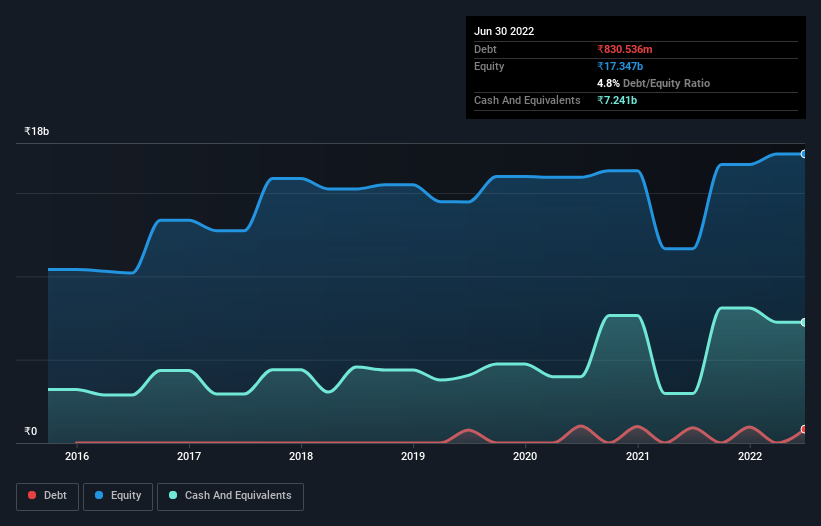
The external fund manager backed by Berkshire Hathaway's Charlie Munger, Li Lu, makes no bones about it when he says 'The biggest investment risk is not the volatility of prices, but whether you will suffer a permanent loss of capital.' When we think about how risky a company is, we always like to look at its use of debt, since debt overload can lead to ruin. Importantly, Colgate-Palmolive (India) Limited (NSE:COLPAL) does carry debt. But should shareholders be worried about its use of debt?
When Is Debt A Problem?
Generally speaking, debt only becomes a real problem when a company can't easily pay it off, either by raising capital or with its own cash flow. In the worst case scenario, a company can go bankrupt if it cannot pay its creditors. However, a more usual (but still expensive) situation is where a company must dilute shareholders at a cheap share price simply to get debt under control. Of course, plenty of companies use debt to fund growth, without any negative consequences. When we examine debt levels, we first consider both cash and debt levels, together.
Check out our latest analysis for Colgate-Palmolive (India)
What Is Colgate-Palmolive (India)'s Debt?
As you can see below, Colgate-Palmolive (India) had ₹830.5m of debt at March 2022, down from ₹911.8m a year prior. However, it does have ₹7.24b in cash offsetting this, leading to net cash of ₹6.41b.

How Strong Is Colgate-Palmolive (India)'s Balance Sheet?
We can see from the most recent balance sheet that Colgate-Palmolive (India) had liabilities of ₹10.8b falling due within a year, and liabilities of ₹846.8m due beyond that. On the other hand, it had cash of ₹7.24b and ₹3.36b worth of receivables due within a year. So its liabilities total ₹1.07b more than the combination of its cash and short-term receivables.
Having regard to Colgate-Palmolive (India)'s size, it seems that its liquid assets are well balanced with its total liabilities. So it's very unlikely that the ₹430.9b company is short on cash, but still worth keeping an eye on the balance sheet. While it does have liabilities worth noting, Colgate-Palmolive (India) also has more cash than debt, so we're pretty confident it can manage its debt safely.
Colgate-Palmolive (India)'s EBIT was pretty flat over the last year, but that shouldn't be an issue given the it doesn't have a lot of debt. The balance sheet is clearly the area to focus on when you are analysing debt. But it is Colgate-Palmolive (India)'s earnings that will influence how the balance sheet holds up in the future. So when considering debt, it's definitely worth looking at the earnings trend. Click here for an interactive snapshot.
But our final consideration is also important, because a company cannot pay debt with paper profits; it needs cold hard cash. Colgate-Palmolive (India) may have net cash on the balance sheet, but it is still interesting to look at how well the business converts its earnings before interest and tax (EBIT) to free cash flow, because that will influence both its need for, and its capacity to manage debt. Over the last three years, Colgate-Palmolive (India) recorded free cash flow worth a fulsome 91% of its EBIT, which is stronger than we'd usually expect. That puts it in a very strong position to pay down debt.
Summing Up
We could understand if investors are concerned about Colgate-Palmolive (India)'s liabilities, but we can be reassured by the fact it has has net cash of ₹6.41b. And it impressed us with free cash flow of ₹16b, being 91% of its EBIT. So is Colgate-Palmolive (India)'s debt a risk? It doesn't seem so to us. The balance sheet is clearly the area to focus on when you are analysing debt. However, not all investment risk resides within the balance sheet - far from it. Be aware that Colgate-Palmolive (India) is showing 1 warning sign in our investment analysis , you should know about...
If you're interested in investing in businesses that can grow profits without the burden of debt, then check out this free list of growing businesses that have net cash on the balance sheet.
New: AI Stock Screener & Alerts
Our new AI Stock Screener scans the market every day to uncover opportunities.
• Dividend Powerhouses (3%+ Yield)
• Undervalued Small Caps with Insider Buying
• High growth Tech and AI Companies
Or build your own from over 50 metrics.
Have feedback on this article? Concerned about the content? Get in touch with us directly. Alternatively, email editorial-team (at) simplywallst.com.
This article by Simply Wall St is general in nature. We provide commentary based on historical data and analyst forecasts only using an unbiased methodology and our articles are not intended to be financial advice. It does not constitute a recommendation to buy or sell any stock, and does not take account of your objectives, or your financial situation. We aim to bring you long-term focused analysis driven by fundamental data. Note that our analysis may not factor in the latest price-sensitive company announcements or qualitative material. Simply Wall St has no position in any stocks mentioned.
About NSEI:COLPAL
Colgate-Palmolive (India)
Manufactures and trades in personal and oral care products in India.
Flawless balance sheet with solid track record.

